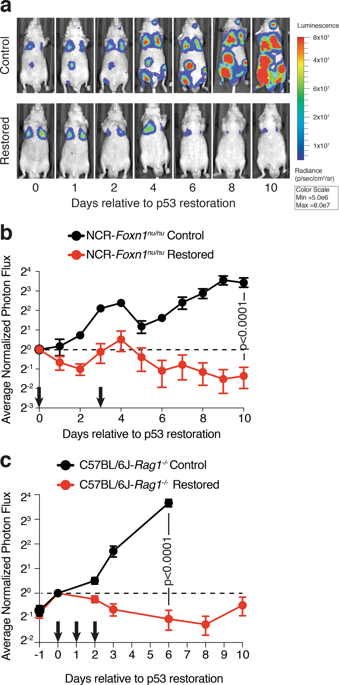Oncogenesis ( IF 5.9 ) Pub Date : 2019-04-01 , DOI: 10.1038/s41389-019-0133-3 Kate L. Stokes , Virna Cortez-Retamozo , Jonuelle Acosta , Brian Lauderback , Camila Robles-Oteiza , Michelle Cicchini , Mikael J. Pittet , David M. Feldser

|
Senescence is an important p53-controlled tumor suppressor program that not only opposes the proliferation of cancer cells but also promotes their immune-mediated clearance in certain contexts. In hepatocellular cancer, p53 induction promotes an innate immune cell-mediated clearance of senescent cells wherein natural killer (NK) cells seem to play the primary sentinel role. Whether NK cells also surveil cancer cells in other tumor types when p53 is activated to promote a senescence response is unknown. To identify the role that NK and other innate immune cell types have on the surveillance and destruction of lung adenocarcinoma cells, we developed an orthotopic transplantation model where p53 gene function could be restored to induce senescence after successful engraftment of tumor cells in the mouse lung. Contrary to precedent, we found that NK cells actually limited the efficient clearance of tumor cells from the mouse lung after p53 restoration. Instead, activation of p53 induced the infiltration of monocytes, neutrophils, and interstitial macrophages. Loss of NK cells further promoted expansion of these inflammatory cell types and tumor clearance after p53 restoration. These observations suggest that NK cell responses to p53 activation in lung adenocarcinoma is distinct from those found in other tumor types and that diverse innate immune cell populations may play context-dependent roles during tumor immune surveillance. Further, our data provide an impetus to understand the broader mechanisms that regulate cancer cell destruction by multiple cell types of the innate immune system and distinct cancer contexts.
中文翻译:

自然杀伤细胞限制衰老的肺腺癌细胞的清除
衰老是p53控制的重要肿瘤抑制程序,它不仅可以对抗癌细胞的增殖,而且在某些情况下还可以促进其免疫介导的清除。在肝细胞癌中,p53诱导促进先天免疫细胞介导的衰老细胞清除,其中自然杀伤(NK)细胞似乎起主要的前哨作用。当p53激活以促进衰老反应时,NK细胞是否还能在其他肿瘤类型中监视癌细胞。为了确定NK和其他先天免疫细胞类型在监视和破坏肺腺癌细胞中的作用,我们开发了一种原位移植模型,在将肿瘤细胞成功植入小鼠肺脏后,可以恢复p53基因的功能以诱导衰老。与先例相反,我们发现NK细胞实际上限制了p53修复后从小鼠肺部清除肿瘤细胞的效率。相反,p53的激活诱导单核细胞,嗜中性粒细胞和间质巨噬细胞的浸润。NK细胞的丢失进一步促进了p53修复后这些炎性细胞类型的扩展和肿瘤清除。这些观察结果表明,在肺腺癌中NK细胞对p53激活的反应与在其他肿瘤类型中发现的反应截然不同,并且不同的先天免疫细胞群体在肿瘤免疫监视过程中可能起上下文相关的作用。此外,我们的数据为了解更广泛的机制提供了动力,这些机制通过先天免疫系统的多种细胞类型和不同的癌症环境来调节癌细胞的破坏。











































 京公网安备 11010802027423号
京公网安备 11010802027423号